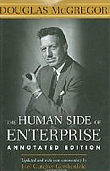 Exploring “The Assumptions of Theory Y,” provided by Douglas McGregor in his seminal book, The Human Side of Enterprise, is an opportunity to challenge the assumptions that keep us from more fully engaging in “work life” and “life work” endeavors. Over the next six entries, I’ll share McGregor’s six Assumptions of Theory Y along with personal insights that are creating opportunities for innovation in my own life: specifically new ideas + action that will create the value I can bring into the world.
Exploring “The Assumptions of Theory Y,” provided by Douglas McGregor in his seminal book, The Human Side of Enterprise, is an opportunity to challenge the assumptions that keep us from more fully engaging in “work life” and “life work” endeavors. Over the next six entries, I’ll share McGregor’s six Assumptions of Theory Y along with personal insights that are creating opportunities for innovation in my own life: specifically new ideas + action that will create the value I can bring into the world.
Assumption 1: The expenditure of physical and mental effort in work is as natural as play or rest. The average human being does not inherently dislike work. Depending upon controllable conditions, work may be a source of satisfaction (and will be voluntarily performed) or a source of punishment (and will be avoided if possible). 1
Consider the two key words: CONTROLLABLE and SATISFACTION. Recognizing that the satisfaction I experience at work is related to controllable conditions, I am reminded that:
I am/can be “in choice” and, therefore, I can directly impact work as a source of satisfaction.
This awareness immediately takes me out of a victim mentality. Of course, the “Yeh butter” will always say, “In a work environment there are always conditions beyond your control that will create dissatisfaction.” My response would be “Yes, that is true”…and, because that assertion is also an assumption we know that it could be untrue, partially true or only true for you. This brings me back to a deeper reflection on the original insight:
My source of satisfaction is related to controllable conditions, many of which are under my control.
One thing that is always under my control is my attitude. When I feel manipulated, I can choose to be curious “Tell me more about what you’re thinking.” When I feel overwhelmed with the tasks at hand, I can choose to set priorities, balance work with fun breaks or ask for help. When I’m feeling unmotivated I can choose to re-engage my passion, gifts and talents and consider how to make the task at hand more engaging for me. Simply being open to new possibilities creates a “new condition” which often creates a noticeable and positive shift in my experience.
THINK ABOUT…
- How satisfied are you with your current condition (at work) on a scale from 1 to 5 where 1 = extremely dissatisfied and 5 = extremely satisfied?
- In your opinion what conditions can you control that will allow you to increase your rating?
- What conditions do you assume you cannot control that keep you from being able to increase your rating?
- What new ideas do you have for being able to move at least one condition from the “can’t control” to the “can control” list?
by Jackie Levin
1 McGregor, D., The Human Side of Enterprise, McGraw-Hill, 1985. Heralded as one of the most important pieces of management literature ever written, a touchstone for scholars and a handbook for practitioners, The Human Side of Enterprise continues to receive the highest accolades nearly half a century after its initial publication. Douglas McGregor was president of Antioch College and a founding faculty member of MIT’s Sloan School of Management. The Human Side of Enterprise was originally published in 1960 but it still on the list of top 100 management books in the U.S. http://www.mcgregor.edu/about/news/dmcgregor.html
More resources:
Employee Motivation, the Organizational Environment and Productivity
Douglas McGregor’s XY Theory
Net MBA: Theory X and Theory Y
